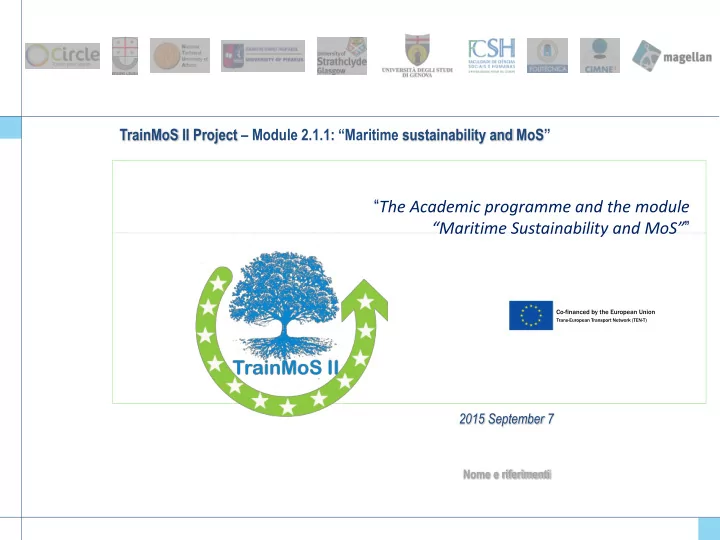

TrainMoS II Project – Module 2.1.1: “Maritime sustainability and MoS ” “ The Academic programme and the module “Maritime Sustainability and MoS ” ” 2015 September 7 Nome e riferimenti
POST GRADUATE TRAINING OFFER MODULE LECTURES MODULE LEADER EXAM 07.09.15 - UNIGE - University of Maritime sustainability and MOS 21.09.15 2.1.1 18.09.15 Genova FCSH - Faculdade de Port planning, infrastructure management and 22.09.15 - Ciências Sociais e 06.10.15 2.1.2 alternative fuel supply chain 05.10.15 Humanas Risk based methods for new fuel technologies (LNG, NTUA - National 07.10.15 - Hydrogen, fuel) and Single windows Technical University 21.10.15 2.1.3 20.10.15 of Athens Port energy operations and clean power investment 22.10.15 - UPM - Universidad analysis Politécnica de Madrid 05.11.15 2.1.4 04.10.15 Energy efficient operation including safe return to 06.11.15 - UoS - University of 20.11.15 2.1.5 port and crisis management 19.11.15 Strathclyde Alternative fuels in the Common European 23.11.15 - Transport Space through intelligent design and UoS + All Universities 09.12.15 2.1.6 04.12.15 innovation
CLASS 2.1.1 AN INTRODUCTION TO TRANSPORTATION SYSTEMS SYNOPSIS Attending students have different knowledge depending on their graduation. Thus this first course aims to provide a basic understanding of transportation systems, sustainability of transport systems, MOS-motorways of the sea and related topics. This way students will be able to attend the other five courses where topics are explained much in deeper. LEARNING After attending this course student should be able to: OUTCOMES 1. Understand the figures and definitions relevant to transportation systems 2. Develop a clear understanding of the sustainable development and sustainable transport 3. Be familiar with the European policies on transportation. 4. Understand how to simulate a transport system 5. Make choices on transport systems based on economic approach 6. Understand the port organization and port procedures 7. Be familiar with the concept of the intelligent transport systems applied to maritime transport 8. Know the main international environmental laws 9. Be familiar with ship characteristics 10. Understand the meaning of energy management in port and on board
Maritime Transport and MoS, port organization and port operations Logistics scenario and operators involved The role of customs in maritime transport and MOS ITS systems in maritime transport and MOS Environment: Marpol convention, waste management, ballast water treatment, etc. Ship classification, ship design and on board apparatuses Energy management in ports and on board
Recommend
More recommend